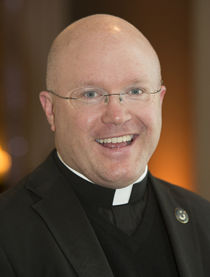
Faith
To think that to draw people in we have to use filth for their ears is as mistaken as thinking we need to use porn for the eyes. It's a superficial and condescending understanding of the unchurched.

Landry
One of the unfortunate controversies about Mark Wahlberg's new movie "Father Stu," especially in Catholic circles, concerns the movie's heavy use of foul language.
One reviewer counted 51 excretory expletives, 43 sexual profanities, as well many verbal condemnations, some invoking God's name. For a movie that runs just under two hours, that's an average of about one obscenity a minute.
The amount of swearing in the movie has detracted from its potential impact by distracting many from what should be the headlines: the inspiring story of Father Stuart Long and the laudable, persevering work of Wahlberg to make a movie about him. It has also dissuaded some of the most dependable supporters of faith-based films from attending, as well as made them reluctant to take their parents, their kids, or their friends.
There were two reasons given for the cussing carpet bombing.
The first is that, prior to his conversion, Stu Long often used vulgarities. Hence no one would have expected him in the movie to sound like Ward Cleaver, Fred Rogers, or Richie Cunningham. To make the point that he was a man of unclean lips, however, how many swears does it take?
Wahlberg in an interview stated that in the editing process he had cut out an additional "74 F-bombs." That implies a realization that the extra expletives were unnecessary to convince the viewer that Stu had an unredeemed tongue. But why did the filmmakers think they still needed 100 obscenities -- 100 -- to make that rather unsubtle point?
The second reason for the effusion of profanity was to make the movie "real," in order to try to reach those who, like the young future Father Stu, would be turned off by a saccharine faith-based film. Profanity, in other words, with the R-rating it garnered, was not just tolerated but treated as a feature.
As Wahlberg stated in an interview, "We all know whom Jesus came to save. ... These are the people we're trying to talk to, especially young people. ... You go to the gas station, you go anywhere, you hear this language all the time."
We can applaud the evangelical motivation, to reach those on the peripheries and try to interest them, so that the powerful story of Stu's eventual conversion might impact them. We can also acknowledge that if the movie regularly substituted "fudge," "shucks," "darn," and "doggonit" for the offensive expressions, there would be plenty who would deem such a sanitized lexicon a foreign language and find those who use it about as interesting as staid professors of ancient Egyptian philology.
But it's important to question the premise of Wahlberg's argument: that in order to be "real" and connect with people today in circumstances similar to the pre-converted Stu, we need to employ foul language -- and employ it a lot.
To be a fisher of men today, do we really need to cuss like a sailor?
The real Father Stu Long clearly didn't think so. He was a priest who connected with young and old, male and female, sick and healthy and almost every group except those who didn't appreciate blunt, manly talking about God, life, love, sin, mercy, and almost any other subject.
As his good friend and ordination classmate Father Bart Tolleson said in an interview, "The ironic thing is that Stu worked really hard to clean up his own language and he challenged other [people], especially guys, to clean up their language. He had many unusual penances he would give them to help them in their use of language."
Another friend, Marguerite Zink, said in a Facebook post, that Father Stu "actually had a 'swear jar' in his nursing home room for his visitors to contribute to when they swore, as he did not swear after his conversion."
He did not swear after his conversion. It is regrettable that that aspect of the converted -- and still super relatable -- Father Stu was not shown in the movie.
Father Tolleson and Mrs. Zink both appealed to potential viewers not to allow the bombardment of bad language turn them away from seeing the movie.
Similarly, leaders in the Diocese of Helena, who had serious reservations about the number of obscenities when they saw the initial script, stated, "Viewers should be warned that the film contains objectionable language, violence, and adult content. It's our hope, however, that the redemptive story of Father Stu's conversion will invite viewers to faith and strengthen believers. ... Father Stu, raw and unfiltered, combative and grace-filled, witnesses to the truth that no one is ever beyond the reach of redemption."
That's clearly an endorsement of Father Stu the priest and seems to be one of "Father Stu" the movie. But it's certainly not an affirmation of the movie's use of "objectionable language" or of the questionable evangelical strategy behind doing so.
The alternative to faith-based films that flatten human life to morality plays fit for small children is not to saturate movies with profanity, which is a cheap and shallow caricature of "reality."
To be real, there are far more effective ways than the use of vulgarities that, whether intended or not, blaspheme God, anathematize others, verbally profane human love and sexuality, or orally disgorge references to excretory orifices and output -- otherwise, popes, priests, religious sisters, missionaries, catechists, parents, presidents and schoolteachers would all have to start modeling their speech on the glossary of R-rated rappers.
To be real, rather, starts with character development, and allowing that character to shine on the big screen: someone who listens, understands, cares, shares others' joys and burdens, speaks truthfully and respectfully, is humble, has a sense of humor and exudes a rich and attractive humanity. This is what we clearly have in the real Father Stu Long, who became more relatable, real, and attractive after his conversion, not less.
To think that to draw people in we have to use filth for their ears is as mistaken as thinking we need to use porn for the eyes. It's a superficial and condescending understanding of the unchurched. It emulates the mentality we sometimes see in silly clergy who think that to be relevant with the young they need to quote Justin Bieber and Dua Lipa.
Such an approach doesn't take seriously the intrinsic attraction of Christ shining through his authentic faithful and shows a defective understanding of the power of the Gospel and how God has made people for it.
The way to draw people toward Christ is not by using the desensitizing language of the gutters. As Jesus, Paul, Francis Xavier, Francis Xavier Cabrini and all of the great evangelizers have shown, it's by reminding them of their dignity and summoning them, if even by small steps and simple, clean words, to aspire to a standard of greatness.
That's a lesson Father Stu Long learned and lived -- and one that this otherwise fine movie about him, to its detriment, unfortunately didn't grasp or depict.
- Father Landry is a priest of the Diocese of Fall River who is national chaplain to Aid to the Church in Need USA, a Papal Missionary of Mercy and a Missionary of the Eucharist for the US Bishops.
Recent articles in the Faith & Family section
-
Wounds, not scarsJaymie Stuart Wolfe
-
A special collection in the liturgy libraryFather Robert M. O'Grady
-
Witness to a Transfiguration in KenyaMichele Miers
-
Understanding the ScripturesScott Hahn
-
'Cabrini' does extraordinary job of bringing saint to lifeBishop Nicholas DiMarzio


















